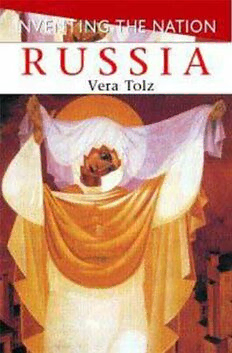
Russia (Inventing the Nation) PDF
320 Pages·2001·17.849 MB·English
Most books are stored in the elastic cloud where traffic is expensive. For this reason, we have a limit on daily download.
Preview Russia (Inventing the Nation)
Description:
The question of national identity is central to the future of Russia. This extensive analysis, spans three centuries of Russian cultural history to place post-communist Russia within a broad historical background. The author focuses on three ways of defining Russia and Russians: Russia as a counterpart to the West; Russians as creators of a unique multi-ethnic community; and Russians as members of the community of Eastern Slavs. She then demonstrates how these three perspectives have dominated the views of Russia in the modern era and traces their origins back to writers and historians in the eighteenth century. Combining a rich historical study with a rigorous analytical framework, the book is an essential tool for understanding contemporary Russia. Vera Tolz is Professor of Russian Studies, University of Manchester. The question of national identity is central to the future of Russia. In this analysis, which spans three centuries of Russian cultural history, Vera Tolz places post-communist Russia in a broad historical background. She focuses on three ways of defining Russia and Russians: Russia as a counterpart to the West; Russians as creators of a unique multi-ethnic community; and Russians as members of the community of Eastern Slavs. She demonstrates how these three perspectives have dominated the views of Russia in the modern era and traces their origins back to writers and historians in the eighteenth century. Combining a rich historical study with a rigorous analytical framework, the book is an essential tool for understanding contemporary Russia. “…[A] major contribution towards elucidating how Russians' own understanding of themselves has evolved over the past three centuries. Most previous Western histories have treated the Soviet Union as an irrelevant or regressive period in the evolution of Russian nationhood. Tolz ‘brings back the Soviet Union,’ not idealizing it but showing that it played its own paradoxical and ambivalent role.”—Times Literary Supplement "[A] substantive and solid overview of the basic concepts and formative issues related to Russian nationalism...[A] valuable addition to the existing studies on these issues."—Slavic and East European Journal“…[A] major contribution towards elucidating how Russians' own understanding of themselves has evolved over the past three centuries. Most previous Western histories have treated the Soviet Union as an irrelevant or regressive period in the evolution of Russian nationhood. Tolz ‘brings back the Soviet Union,’ not idealizing it but showing that it played its own paradoxical and ambivalent role.”—Times Literary Supplement “…[Thoroughly] researched and clearly written…Reading the book is illuminating…”—History: Reviews of New Books “Although a volume so kaleidoscopic in content, so allusive in argument, and so multilayered in construction necessarily yields more to those familiar with the subject than it can to the novice, Tolz writes vigorously throughout, and readers at all levels of sophistication will have something to learn from her consistently interesting book.”—Slavonica
See more
The list of books you might like
Most books are stored in the elastic cloud where traffic is expensive. For this reason, we have a limit on daily download.
